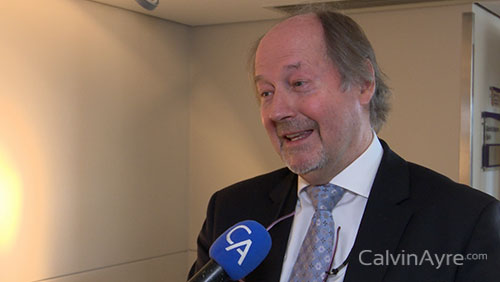In this interview with CalvinAyre.com’s Rebecca Liggero, The Economist contributing editor John Andrews discusses how Donald Trump’s White House win will impact not just the United States, but the whole world.
Say whatever you want about Donald John Trump, but the fact remains clear: the 70-year-old brash businessman has made history, and in January 2017, he will be sworn in as the 45th President of the United States and will effectively become the most powerful man in the free world.
So what comes next for the United States and the rest of the world? Well, according to John Andrews, a journalist specializing in world politics and current contributing editor for The Economist, it’s time to get the popcorn buckets ready.
“The rest of the world is still probably in a little bit of a shock and wondering how to react and hope. I think the hope is, OK, he’s a businessman, he’ll be pragmatic. He’ll get good people around him. We shouldn’t exaggerate the dangers, etc, etc. But it’s going to be an interesting time and you know how with the Chinese… interesting [could come] to mean dangerous, so it will be tricky,” Andrews told CalvinAyre.com.
Trump’s election victory has, without a doubt, sent shockwaves around the globe, particularly among the leaders, particularly in Europe, who have been publicly critical of the mogul during the campaign season. But Andrews said they may have to set those differences aside and work in the interest of the free world.
“Several European leaders have been publicly critical of Trump during the campaign and so they’re going to have to back track from that. But I think Trump is a realist, they are a realist, and so they’ll realize they’ll have to talk to each other, they have to cooperate, collaborate. After all, it is still the free world, etc, so there is a vested interest,” Andrews said. “At the same time, you’ve got well-established civil services on both sides of the Atlantic and the civil services are very professional, they will do their best to calm things down.”
Media is a different story, and one that could potentially cause “megaphone diplomacy” issues.
“Any megaphone diplomacy problems, I think will tend to come from the media and that could be I think a problem for both. I mean, Fox News for example, I imagine will crow with triumph, CNN would be a little upset and in Europe, I think, almost universally, there will be disappointment. Apart from UK and Nigel Farage, who was essential to winning the Brexit vote. He was, of course, a supporter of Donald Trump and appeared several times with Donald Trump on campaign platforms in the states and in fact, Trump kept saying, ‘This is our American chance to be like Brexit.’ But nonetheless, that I think would be a minority view other of course from Russia and maybe Russia’s traditional European allies. I mean Greece, for example, [and] Cyprus, they may be less inclined to criticize Trump in the media,” Andrews said.
